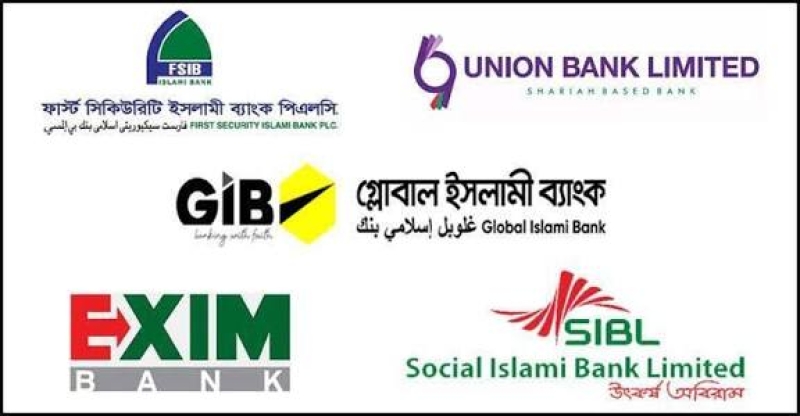- Young disabled people of BD vow to advocate for peace |
- World Leaders Urged to Defend Human Rights and Justice |
- Vegetable prices remain high, people buy in small quantities |
- Off-season watermelon brings bumper crop to Narail farmers |
- Climate Change Drives Deadly Floods, Storms, and Water Crises |
Forced merger of 5 Shariah banks in BD faces hurdles

Bangladesh Bank’s plan to merge five weak Islamic Shariah-based banks into a single state-owned entity has been hailed as a bold attempt to stabilise the banking sector, but experts warn the move faces enormous challenges and could take years to achieve meaningful results.
The five banks—First Security Islami Bank, Union Bank, Global Islami Bank, Social Islami Bank, and Exim Bank—are mired in crisis, with non-performing loans (NPLs) now at a staggering Tk1,47,000 crore, or 77 per cent of their total loans. Union Bank tops the list with an almost complete default ratio of 98 per cent.
Depositors’ funds are effectively frozen, while the banks rely on massive central bank support to stay afloat.
“The biggest challenges are recovering stolen assets, securing skilled management, and ensuring political interference does not derail the process,” said Dr Zahid Hussain, former lead economist at the World Bank’s Dhaka office.
He stressed that forged documents and smuggling of assets abroad complicate recovery efforts.
Adding to the difficulty, forced mergers in Bangladesh differ sharply from international norms.
Dr Fahmida Khatun, Executive Director of the Centre for Policy Dialogue, explained, “Globally, weak banks propose mergers to stronger banks after thorough audits. A forced merger risks worsening the crisis, though it may protect depositors’ money.”
The merger process is also costly. Bangladesh Bank estimates it at Tk35,000 crore—Tk25,000 crore from the national budget and Tk10,000 crore from the Deposit Insurance Trust Fund—requiring amendments to existing law to use public funds.
S&P Global Ratings warns that structural problems will keep Bangladesh’s banking sector under pressure until 2026. High credit risk, fragmented operations, executive failures, and weak lending standards are cited as long-standing issues.
The merger faces resistance from some banks, particularly Exim Bank and Social Islami Bank, whose directors and shareholders have petitioned to be excluded.
Meanwhile, concerns over potential branch closures and job losses persist, though Bangladesh Bank promises new rural branches and local investment of deposits to minimise layoffs.
With capital shortfalls, soaring bad loans, and political sensitivities, the path to a successful merger is fraught with obstacles. Experts say it may take several years before the new bank stabilises—leaving depositors, employees, and the broader financial system in a tense waiting game.
The latest data from the Bangladesh Bank reveals a dire situation for the five banks. Their combined deposits plummeted to Tk1,36,546 crore in May, down from approximately Tk1,59,000 crore just a year ago. In contrast, their total loans have surged to Tk1,95,413 crore.
The most alarming aspect is the skyrocketing default ratio of loans. These five banks' non-performing loans (NPLs) now stand at a staggering Tk1,47,000 crore, which represents 77 percent of their total loans. Union Bank's NPL is nearly 98 percent, followed by First Security with 96 percent, Global Islami Bank with 95 percent, Social Islami Bank with 62 percent, and Exim Bank with 48 percent.
This means that a significant portion of the money deposited by customers is now stuck in defaults, leaving the banks struggling to repay depositors. They have had to take thousands of crores of taka in special assistance from the central bank. The banks also face a massive provision shortfall of Tk74,501 crore, reports UNB.

